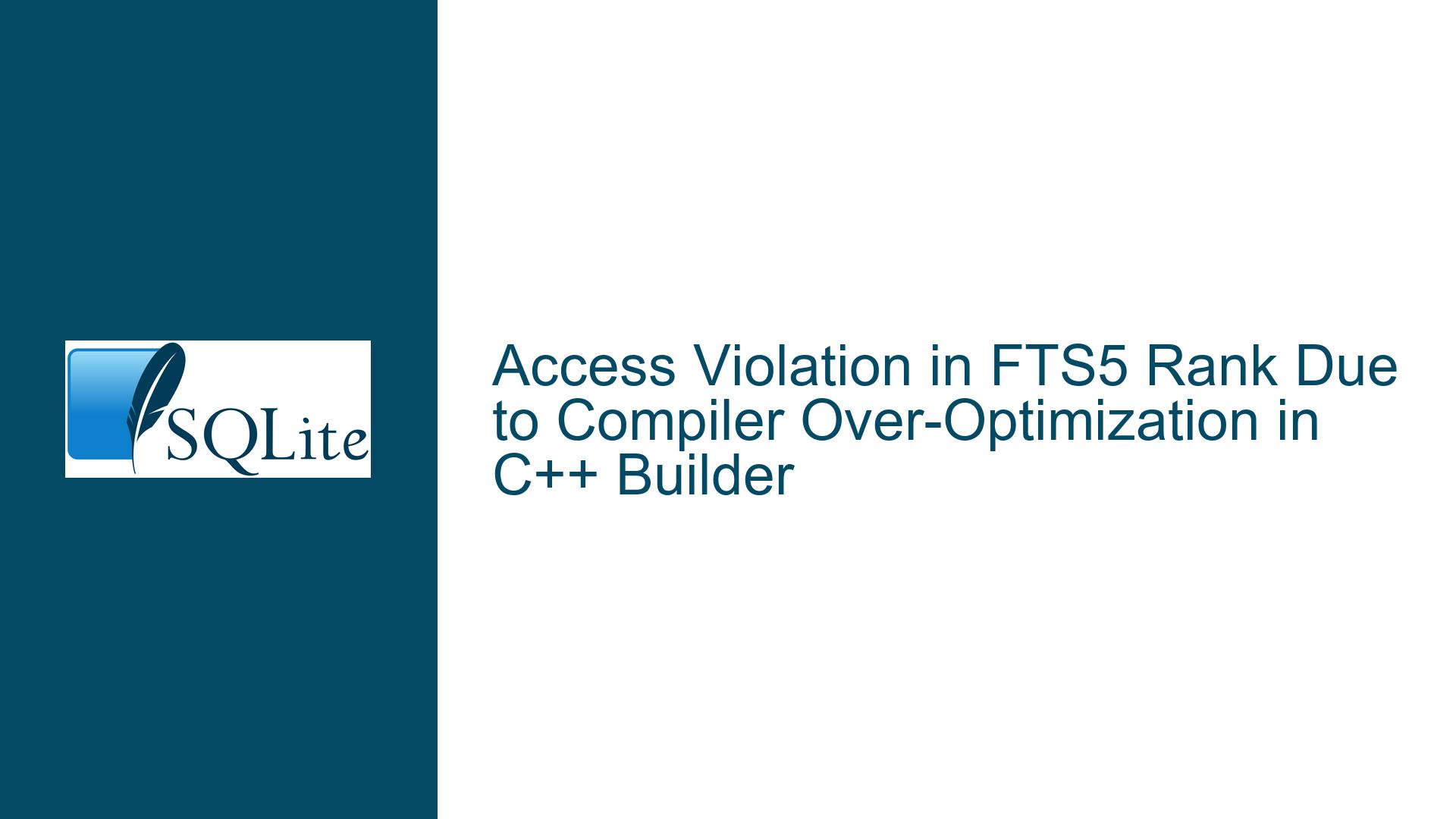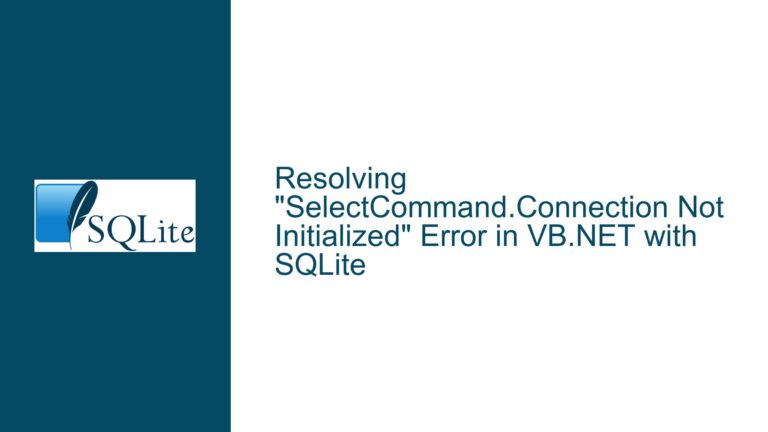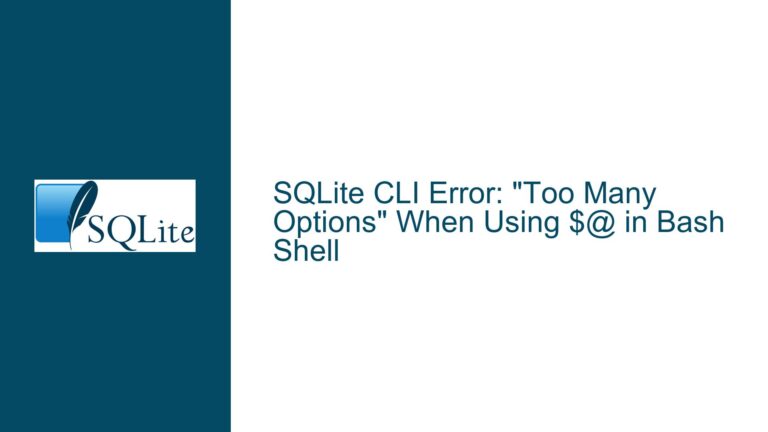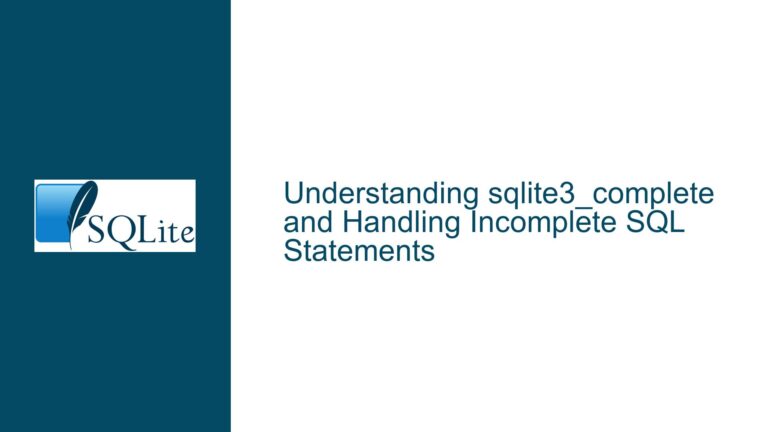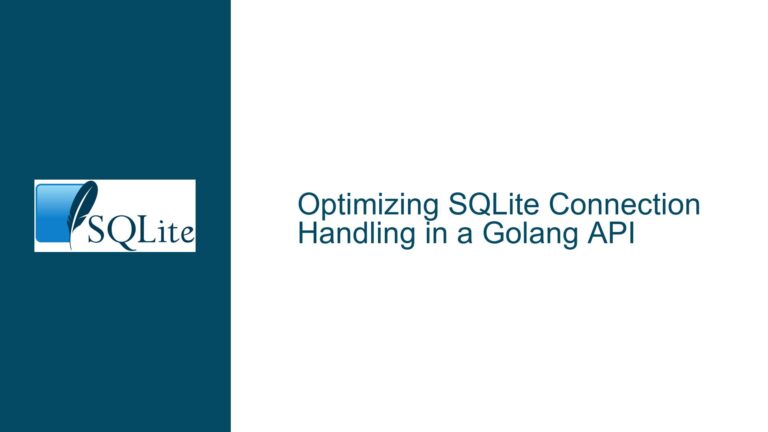Access Violation in FTS5 Rank Due to Compiler Over-Optimization in C++ Builder
Access Violation in FTS5 Rank Function Due to Compiler Over-Optimization
The core issue revolves around an Access Violation (AV) that occurs when running the FTS5 rank function in SQLite, specifically when compiled using Embarcadero’s C++ Builder. The problem manifests in a for loop within the fts5Bm25Function where the compiler optimizes out a critical check rc==SQLITE_OK. This optimization leads to a scenario where pData is dereferenced even when it is NULL, causing the Access Violation. The issue is particularly insidious because it stems from the compiler’s behavior rather than an explicit bug in the SQLite code. The compiler’s over-optimization removes the check for rc==SQLITE_OK because the rc variable is not used within the loop, leading to the crash.
The problematic loop is part of the BM25 scoring algorithm, which calculates the relevance score of a document based on term frequency and inverse document frequency. The loop iterates over phrases and calculates the score contribution of each phrase. The crash occurs because the loop attempts to access pData->nPhrase and pData->aIDF without ensuring that pData is valid, which is supposed to be guarded by the rc==SQLITE_OK check.
The issue is further complicated by the fact that the same loop structure works correctly in other parts of the code where rc is used within the loop. This suggests that the compiler’s optimization behavior is context-sensitive and depends on whether the variable is used within the loop body. The problem is reproducible and has been confirmed by both the original poster and the SQLite development team.
Compiler Over-Optimization and Unused Variable Warnings
The root cause of the issue lies in the compiler’s optimization behavior. Embarcadero’s C++ Builder optimizes out the rc==SQLITE_OK check because the rc variable is not used within the for loop. This is a common optimization technique where compilers remove code that appears to have no effect on the program’s outcome. However, in this case, the optimization is incorrect because the check is necessary to prevent dereferencing a NULL pointer.
The issue is exacerbated by the fact that the rc variable is assigned a value that is never used within the function, leading to a compiler warning: "Warning W8004 fts5_aux.c 643: ‘rc’ is assigned a value that is never used in function fts5Bm25Function". This warning is a red herring in the context of the Access Violation but highlights the broader issue of unused variables in the code.
The problem is not unique to Embarcadero’s C++ Builder. Similar issues can arise with other compilers that perform aggressive optimizations, especially when dealing with strict aliasing rules or other low-level optimizations. However, in this specific case, the issue is tied to the behavior of C++ Builder and its handling of unused variables within loops.
The original poster and the SQLite development team identified that moving the for loop inside the if( rc==SQLITE_OK ) block resolves the issue. This change ensures that the loop is only executed when rc is SQLITE_OK, effectively preventing the dereferencing of pData when it is NULL. Additionally, this change removes the redundant rc==SQLITE_OK check within the loop, making the code more efficient and less prone to compiler optimizations.
Implementing Code Restructuring and Compiler-Specific Workarounds
To address the issue, the code must be restructured to ensure that the rc==SQLITE_OK check is not optimized out. The following steps outline the necessary changes and provide a detailed explanation of the solution:
Move the For Loop Inside the
if( rc==SQLITE_OK )Block: The primary fix involves moving the for loop inside theif( rc==SQLITE_OK )block. This ensures that the loop is only executed whenrcisSQLITE_OK, preventing the dereferencing ofpDatawhen it is NULL. The modified code looks like this:if( rc==SQLITE_OK ){ int nTok; rc = pApi->xColumnSize(pFts, -1, &nTok); D = (double)nTok; for(i=0; i<pData->nPhrase; i++){ score += pData->aIDF[i] * ( ( aFreq[i] * (k1 + 1.0) ) / ( aFreq[i] + k1 * (1 - b + b * D / pData->avgdl) ) ); } sqlite3_result_double(pCtx, -1.0 * score); } else { sqlite3_result_error_code(pCtx, rc); }This change ensures that the loop is only executed when
rcisSQLITE_OK, effectively preventing the Access Violation.Remove Redundant
rc==SQLITE_OKChecks: The original code contains redundantrc==SQLITE_OKchecks within the loop. These checks are unnecessary because the loop is now inside theif( rc==SQLITE_OK )block. Removing these checks simplifies the code and reduces the likelihood of compiler optimizations causing issues.Address Compiler Warnings: The compiler warning about the unused
rcvariable should be addressed to avoid confusion. While this warning is not directly related to the Access Violation, it is good practice to ensure that all variables are used appropriately. In this case, the warning can be ignored becausercis used in the broader context of the function.Test with Different Compilers: To ensure that the issue is resolved and does not reappear with other compilers, the modified code should be tested with multiple compilers, including GCC, Clang, and MSVC. This testing will help identify any compiler-specific issues and ensure that the code is robust across different environments.
Consider Compiler-Specific Workarounds: If the issue persists with other compilers, consider implementing compiler-specific workarounds. For example, using
#pragmadirectives to disable specific optimizations or adding volatile qualifiers to critical variables can help prevent similar issues. However, these workarounds should be used sparingly and only when necessary to avoid introducing additional complexity into the code.
By following these steps, the Access Violation issue can be resolved, and the code can be made more robust against compiler optimizations. The key is to ensure that critical checks are not optimized out and that the code is structured in a way that is clear and easy to understand. This approach not only fixes the immediate issue but also improves the overall quality and maintainability of the code.
